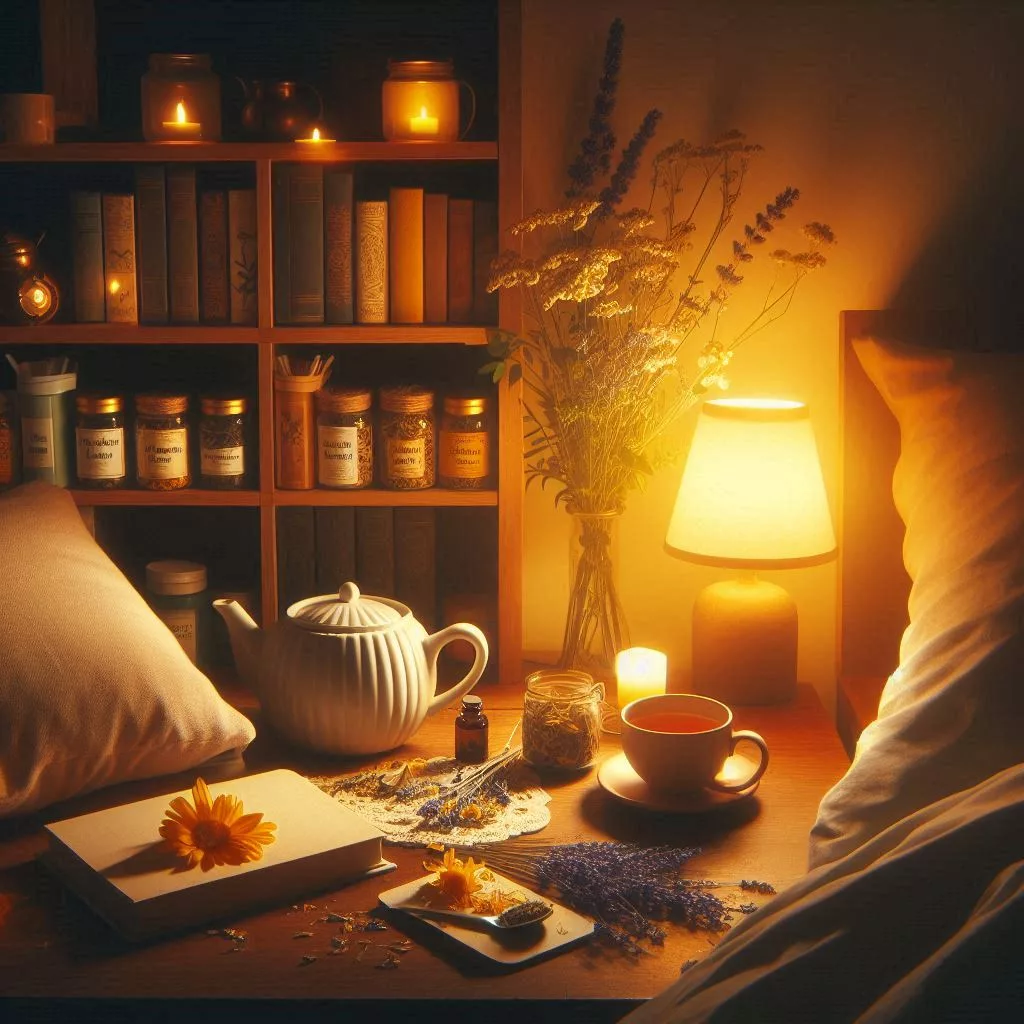Sleep-Inducing Teas For A Calm Night’s Sleep
Ever wondered why some teas seem to work like a charm, sending you off to dreamland with ease? Join me as we explore the soothing power of sleep-inducing teas, unraveling the secrets behind their natural ingredients that promise a night of restful slumber. From the calming embrace of chamomile to the aromatic magic of lavender, let’s discover how these comforting brews can transform your bedtime ritual.

The Natural Sedatives in Your Teacup
Ever wondered why certain teas seem to have the magical ability to send us off to dreamland? The secret often lies in the natural compounds found within the leaves of these plants, which have been used for centuries for their relaxation properties. From the soothing ritual of sipping a warm cup before bed to the specific ingredients that make counting sheep a thing of the past, these teas are more than just a cozy habit—they’re backed by science.
Chamomile: known for its anti-inflammatory and stress-relieving effects, contains a powerful antioxidant called apigenin. This substance binds to specific receptors in your brain, potentially decreasing anxiety and initiating sleep. Studies have shown that chamomile can improve sleep quality, making this a great sleep-inducing tea to incorporate into your routine. The presence of chamomile tea in your evening ritual can soften the sharp edges of a stressful day and pave the way to a good night’s sleep.
Lavender: famous for its captivating fragrance and popularity in aromatherapy. In tea form, lavender can work wonders for those looking to reduce anxiety and improve sleep quality. Research suggests that lavender tea enhances both sleep duration and quality, particularly among women. Its soothing scent and the compounds within have shown promise in enhancing sleep duration, making it a great choice for those who struggle with sleep disturbances.
Valerian Root: another heavy hitter in the world of sleep-inducing teas. By boosting levels of gamma-aminobutyric acid (GABA) in the brain, valerian root doesn’t just help you fall asleep; it helps you stay asleep. GABA is a neurotransmitter that your body uses to quell nerve activity, which makes valerian root tea a natural aid for those tossing and turning nights. Supported by research, valerian root is an effective sleep aid without the grogginess often linked to medications.
Passionflower: also steps into the spotlight with its ability to increase GABA levels. This translates to a calming effect on the brain that can help alleviate insomnia and boost overall mood. Seen as a potential match for prescription sedatives, passionflower’s sleep-inducing tea offers a natural alternative for improving sleep and enhancing mood.
Lemon Balm: promotes relaxation and could encourage a deeper and more satisfying slumber. Studies indicate its potential as a mild sedative, bumping up those GABA levels to secure a deeper night’s sleep. Its calming properties make it a delightful addition to any bedtime routine.
Ashwaganda: is recognized for inducing calmness and combating insomnia. It’s not only about the anecdotal nods; this herb has shown its mettle in scientific studies, improving sleep quality for those primarily troubled by insomnia.
Tulsi: wraps up our herbal ensemble with its role as an adaptogen, reducing stress and boosting relaxation. This isn’t just an stress-reliever; research reveals improvements in perceived stress and sleep quality when regularly sipped before bedtime.
Ginger: may seem like an odd one out, but its comforting qualities for those seeking sleep cannot be ignored. While studies focusing specifically on sleep are limited, the soothing effects on the stomach and anti-inflammatory properties contribute to overall relaxation, a precursor to good sleep.
Mint: with peppermint and spearmint varieties, offers unique benefits. Peppermint aids digestion and muscle relaxation, while spearmint provides a milder taste with potential relaxation perks.
Now that we’ve explored the potent combination of herbal allies and science, it’s clear that these sleep-inducing teas do more than just warm you up. They hold the key to a tranquil night, each bringing its unique benefits to the table.
Crafting Your Nightly Brew: Tips for Enhanced Sleep Quality
Now that you’re familiar with the many sleep-inducing teas that can shepherd you to dreamland, let’s talk about brewing the perfect cup for sleep. You’re going to find out that it’s quite simple, and with a few tweaks, you can elevate your bedtime routine to new heights.
Choose a tea that resonates with you. If the scent of lavender makes you feel like you’re strolling through a fragrant meadow, then lavender tea might be your ticket to a calm night’s sleep. On the flip side, if you’re drawn to the earthy wholesomeness of chamomile, that’s your go-to.
A good tip for brewing is to keep your water temperature in check. Boiling water can be fierce, and we don’t want to offend the delicate nature of these herbs. Aim for hot but not scalding water to preserve the integrity of the tea’s soothing properties.
Custom blends can be your secret weapon. A pinch of this, a sprinkle of that – creating a mix of, say, chamomile and mint, can not only be fun but also highly beneficial. Just remember, the idea is to relax, so don’t stress about getting the proportions right on your first attempt. You can always adjust your approach down the road.
When should you drink your tea for maximum sleepytime effect? Sipping your brew 2-3 hours before hitting the hay works wonders. It gives your body ample time to ease into relaxation mode and lets you avoid any nighttime dashes to the bathroom.
Finally, while herbal teas are generally safe, they’re not candy. Too much of a good thing can be a not-so-good thing. Pay attention to your body’s reactions to different herbs and set limits to avoid any adverse effects. A cup or two should suffice in most cases.
Sipping Safely: Precautions and Considerations
While sleep-inducing teas can be a wonderful addition to your nightly routine, it’s important to approach them with a few precautions and considerations to ensure your experience is both safe and beneficial.
Choose Caffeine-Free Options: When selecting a tea to help you sleep, always opt for caffeine-free varieties. Caffeine is a stimulant that can disrupt your ability to fall asleep and stay asleep. Be mindful of herbal blends that might contain hidden caffeine sources like green or black tea.
Consult with your Doctor: If you are pregnant, nursing, or have any pre-existing health conditions, it’s crucial to consult with your healthcare provider before adding new herbal teas to your routine. Some herbs can interact with medications or may not be recommended for certain health conditions. Your doctor can provide personalized advice to ensure your chosen teas are safe for you.
Start with Small Quantities: When introducing a new herbal tea into your routine, start with a small quantity to see how your body reacts. Some herbs can cause allergic reactions or digestive upset in sensitive individuals. By starting small, you can monitor any adverse effects and adjust your intake accordingly.
Monitor Your Intake: While herbal teas are generally safe, it’s important to consume them in moderation. Drinking excessive amounts of any tea can lead to unwanted side effects, such as digestive issues or interactions with medications. Typically, one to two cups per night should be sufficient to reap the benefits without overdoing it.
Be Aware of Allergies and Sensitivities: If you have known allergies to certain plants or herbs, check the ingredients of your teas carefully. For example, individuals allergic to ragweed might experience reactions to chamomile. If you experience any adverse symptoms like itching, swelling, or difficulty breathing after drinking a tea, discontinue use immediately and seek medical attention.
Avoid Teas with Unknown Ingredients: Stick to reputable brands and avoid teas with unspecified or unfamiliar ingredients. This can help you avoid potentially harmful additives or contaminants. Quality control varies between brands, so choose those that are transparent about their sourcing and ingredients.
Pay Attention to Your Body: Listen to your body and its responses to different teas. If you notice any unusual symptoms or if a tea makes you feel uneasy, it’s best to stop using it. Everyone’s body reacts differently, and what works well for one person might not work for another.
Stay Hydrated: While herbal teas contribute to your daily fluid intake, it’s important to balance them with regular water consumption. Proper hydration supports overall health and helps maintain optimal bodily functions, including sleep.
Avoid Sweeteners and Additives: the best sleep-inducing effects, avoid adding sugar or artificial sweeteners to your tea. These can spike your blood sugar levels and potentially interfere with sleep. If you prefer a bit of sweetness, consider natural options like a small amount of honey or stevia.
In Review
As you explore the tranquil world of sleep-inducing teas, we hope you find a soothing nightly ritual that brings you the restful sleep you deserve. Have you tried any of the teas mentioned, or do you have a favorite bedtime brew of your own? We’d love to hear about your experiences and any tips you might have for creating the perfect nighttime tea routine. Share your thoughts and join the conversation in the comments below – your insights could be the key to helping others unlock their best night’s sleep.

Hi Jessica, Thank you for this great run-down on sleep-inducing teas. While I have not explored many of the others, I always have chamomile tea in my pantry. I mostly do not have trouble with sleep, but on those nights when I just can’t seem to settle, I make myself a cup of chamomile and am soon lulled into slumber. I really enjoyed reading about the others, and may give some of them a try. Thanks again. Jeni.
Hey Jenni, Im happy to hear chamomile tea works well for you, it’s such a soothing option! If you give some of the others a try I hope they help you as well! If you have any other favorites down the road Id love to hear about them! Thank you for the feedback!
It was great on how you broke down the benefits of each type of sleep-inducing tea with such clarity. Your explanations of natural sedatives like chamomile and lavender, and their scientific backing, make it easy to see why these teas are so effective for a restful night’s sleep. Your tips on crafting the perfect nightly brew are both practical and encouraging, making the whole process seem like a relaxing ritual rather than a chore.
I’m particularly interested in the custom blends you mentioned. Have you tried combining any of these teas yourself, and if so, which combinations have you found to be the most effective or enjoyable? I think experimenting with blends could be a fun way to discover new flavours and benefits. Looking forward to hearing your thoughts.
David
Thank you for your thoughtful feedback! Im happy to hear you found the breakdown of each variety of tea and their benefits clear and helpful! Regarding custom blends, I have indeed tried combining a couple, one of my favorites is chamomile and lavender, soothing, relaxing and smells amazing. Another combination would be valerian root and passionflower, both have a calming effect that help me get deeper sleep. It’s fun experimenting with different flavors and the combinations are endless really!